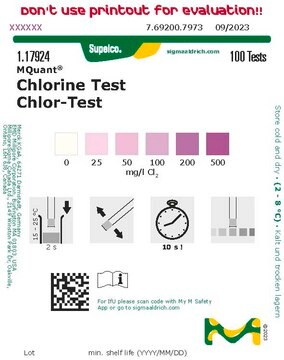1.17925
Chlorine Test Strips, colorimetric
0-20 mg/L (Cl₂), MQuant®
Synonym(s):
Chlorine chemical test strips
About This Item
Recommended Products
product name
Chlorine Test, colorimetric, 0-20 mg/L (Cl2), MQuant®
Agency
suitable for EPA 1621
Quality Level
description
semi-quantitative
product line
MQuant®
specific analyte(s)
chlorine
reaction suitability
reaction type: Redox Reactions
greener alternative product characteristics
Waste Prevention
Learn more about the Principles of Green Chemistry.
sustainability
Greener Alternative Product
measuring range
0-20 mg/L (Cl2)
detection method
colorimetric
greener alternative category
storage temp.
2-8°C
General description
Method: Colorimetric with test strips, 0 - 0.5 - 1 - 2 - 5 - 10 - 20 mg/L Cl2, MQuant®
The MQuant®Chlorine test strips are a rapid exploratory test for free chlorine and are intended primarily for checking the use of chlorinated disinfectants. Chlorinated disinfectants are still in common use all over the world, their major applications being in the chlorination of drinking water and swimming pools. On the test strip, chlorine oxidizes an organic compound to a violet dye. The chlorine concentration is measured semiquantitatively by visual comparison of the reaction zone of the test strip with the fields of a color scale. For a quantitative measurement or a measurement of total chlorine, please refer to our tests for chlorine from our Reflectoquant® or Spectroquant® portfolio.
Design for sustainability benefits:
We continue to demonstrate our commitment to our planet and a sustainable future by exploring ways to improve existing products in our portfolio. We have recently reviewed the current line of MQuant® test strips to identify key opportunities to minimize impact without compromising on the product performance.
This product has benefited from:
- Test strip with reduction
- Recycled aluminum tube
- Digital instruction leaflet
Learn more about the initiative: Small Changes to Test Strips for Big Impact.
Application
- 3,3′,5,5′-tetramethylbenzidine as a multi-colorimetric indicator of chlorine in water in line with health guideline values: This study focuses on using 3,3′,5,5′-tetramethylbenzidine as an indicator for the presence of chlorine in water, providing a method to ensure compliance with health guidelines through a visual and straightforward test (Palladino et al., 2020).
- Analysis of free chlorine in aqueous solution at very low concentration with lateral flow tests: This paper introduces a method for testing free chlorine concentrations in water at very low levels using lateral flow assays, which are crucial for monitoring water quality and ensuring safety standards (Schwenke et al., 2019).
- Some factors influencing the stability of Sterilox, a super-oxidised water: This article, while focused on the stability of Sterilox as a disinfectant, deals with the broader context of using chlorine solutions in settings requiring stringent sanitation measures, highlighting the importance of regular chlorine testing to ensure efficacy (Rossi-Fedele et al., 2011).
Linkage
Legal Information
Hazard Statements
Precautionary Statements
Hazard Classifications
Aquatic Chronic 3
Storage Class Code
11 - Combustible Solids
WGK
WGK 3
Certificates of Analysis (COA)
Search for Certificates of Analysis (COA) by entering the products Lot/Batch Number. Lot and Batch Numbers can be found on a product’s label following the words ‘Lot’ or ‘Batch’.
Already Own This Product?
Find documentation for the products that you have recently purchased in the Document Library.
Articles
Learn about disinfection control and how to select the right disinfectant among the various options available in its methods and instrumentation based on photometry and reflectometry.
Protocols
Preparation of a standard solution for free Chlorine according to DIN EN ISO 7393
Related Content
AQA Standard for free chlorine - Preparation of a standard solution for free chlorine
Disinfection control solutions ensure food safety and regulatory compliance in food & beverage manufacturing.
Our team of scientists has experience in all areas of research including Life Science, Material Science, Chemical Synthesis, Chromatography, Analytical and many others.
Contact Technical Service






